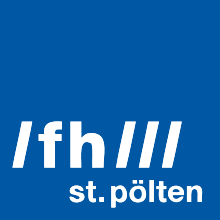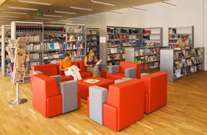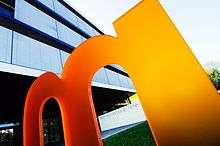St. Pölten University of Applied Sciences
The St. Pölten University of Applied Sciences (German: Fachhochschule St. Pölten) was founded in 1993 and has approximately 3,200 students enrolled. It currently offers 26 degree programmes. Study opportunities comprise degree programmes and continuing education courses in the fields of Health and Social Sciences, Business, Mobility, and Technology. These courses are both academically and vocationally oriented and include training in business administration, law, foreign languages, and interpersonal skills.
 | |
| Established | 1993 |
|---|---|
Administrative staff | Executive Board: Gernot Kohl Staff Members: 351 full-time staff members (administrators and instructors) approximately 787 part-time instructors (as of 2018) |
| Students | 3.219 (as of 2018) |
| Location | Sankt Poelten / Capital of Lower Austria , Austria |
| Website | http://www.fhstp.ac.at/en |
Students can choose to acquire international certificates, such as those offered by Cisco, Microsoft, and Cambridge. Work placements seek to ensure that they gain hands-on experience in the workplace before graduation. Teaching is by lectures, laboratory work and small tutorial groups. Students carry out practical work and team projects. Among the facilities of the university are a library, state-of-the art video, computer, network and multimedia laboratories, and satellite equipment. The students run their own radio station, Campus Radio 94.4.
History

The History of the UAS St. Pölten began in 1993, when the „Verein zur Föderung der Gesellschaft zur Durchführung von Fachhochschul-Studiengängen St. Pölten m.b.H.“ (eng.: Association for the Advancement of the Society for the Implementation of the University of Applied Sciences St. Pölten ltd.) was founded. In the academic year 1996/97 with Telecommunication and Media the first degree programme started. In 2004 the facility was awarded the legal designation 'University of Applied Sciences'. In 2007 the St. Pölten UAS moved to the building in the Matthias Corvinus-Straße. The new campus was officially opened in the presence of Federal President Dr. Heinz Fischer. At the moment the educational offer covers 13 bachelor‘s and 13 master‘s degree programmes as well as 22 further Education Courses.
General information
Study Programmes

All study programmes are offered in the international Bachelor/Master system. As a participant in the Erasmus, Ceepus and Leonardo programmes, the university encourages students to spend a semester studying or working abroad. There is an exchange of students and lecturers with partner universities across Europe, in Latin America, and China.
Degree Programmes
Bachelor's degree programmes[1]
- Marketing & Communication
- Management & Digital Business
- Media Management
- Media Technology
- Creative Computing
- Smart Engineering of Production Technologies and Processes
- IT Security
- Data Science and Business Analytics
- Rail Technology and Mobility
- Dietetics
- Healthcare and Nursing
- Physiotherapy
- Social Work
Master's degree programmes[2]
- Digital Marketing & Communication
- Digital Media Management
- Economic and Financial Communications
- Digital Design
- Digital Media Production
- Interactive Technologies
- Digital Media Production
- Information Security
- Cyber Security and Resilience
- Rail Technology and Management of Railway Systems
- Digital Healthcare
- Social Work
- Applied Research and Innovation in Computer Science
Further Educational Courses
- Advertising and Brand Management
- Digital Marketing
- Event Management
- PR & Communications Management, MSc
- Agricultural Management and Technology Management, MSc
- Applied Photography
- Production and Technology Management, MSc
- Film, TV & Media – Creation and Distribution, MA
- European Railway Systems
- GAIT – Analysis and Rehabilitation
- Start-Up Competence Dietetics
- Applied Nutritional Therapy
- Web and Mobile Development
- Family Group Conference
- Social Pedagogy
- Addiction Counselling and Prevention, MSc
- Short courses for social work practitioners
- Social Work with Asylum Seekers and Convention Refugees
Campus
New university building
With several new degree programmes about to commence and student admissions rising continually, the University is growing fast and has had to grapple with increasing problems of space. Since the Winter Term 2007 the Sankt Pölten University of Applied Sciences has been located in a new 14,300 square metre campus building. The new university, designed by a team of Viennese architects and situated on an area of 8,560 square metres right next to the town centre, accommodate modern offices, lecture halls, studios, laboratories, and a library. The foundation stone for the new university building was laid on March 23, 2006. The mayor of Sankt Poelten, local dignitaries and representatives of the university joined in the ceremony.
Infrastructure:
- 5 lecture halls providing 550 seats in total
- 24 seminar rooms
- 10 multimedia laboratories
- 7 computer rooms
- Ballroom for up to 500 people
- Cafeteria with about 170 seats
- a library containing 30,000 volumes and 150 scientific and professional periodicals
- 225-space parking lot
Institutes
The research teams concerning content became institutes in 2007.
- Carl Ritter von Ghega Institute for Integrated Mobility Research
- Ilse Arlt Institute for Social Inclusion Research
- Institute for Sciences and Services in Health
- Institute of IT Security Research
- Institute for Creative\Media/Technologies
- Josef Ressel Center TARGET
- The Austrian Institute for Media Economy
- Centre of Competence in Simulation
Campus Radio 94.4
The St. Pölten University of Applied Sciences offers its own radio station Campus Radio 94.4. There students learn how to run a radio station.
C-TV - Campus TV
Since May 2007 the students have had the possibility to work actively at an educational television transmitter named Campus TV, C-TV for short. The contributions are all provided from projects of students in the context of the Media Technology degree programme. C-TV is broadcast via internet stream, and rather every Tuesday evening via the Vienna regional cable TV channel Okto.
fhSPACEtv
fhSPACEtv is an interdisciplinary initiative of the fields of study Media Technology and Digital Media Technologies / Institute of Creative\Media/Technologies. This cooperation attempts to merge creative and artistic potential within the departments of the UAS and to integrate specific approaches and requirements for the digital medium by gathering contemporary and alternative information channels and forms of presentation in a pool for students.
SUMO educational magazine
SUMO is an educational magazine of the University of Applied Sciences. The students work on print media, get together in teams (Marketing, Editorial department, and Production) and acquire knowledge of professionals in business. A combination of theory and practical experiences seeks to ensure the quality of the magazine.
Sources
- "Bachelor Studies". St. Pölten University of Applied Sciences.
- "Master Studies". St. Pölten University of Applied Sciences.
External links
- Homepage of the Sankt Poelten University of Applied Sciences (in German and English)
- Campus Radio 94.4 (in German)
- SUMO educational magazine (in German)
- Institute for Media Informatics (in German)
- Ilse Arlt Institute for Social Inclusion Research (in German)